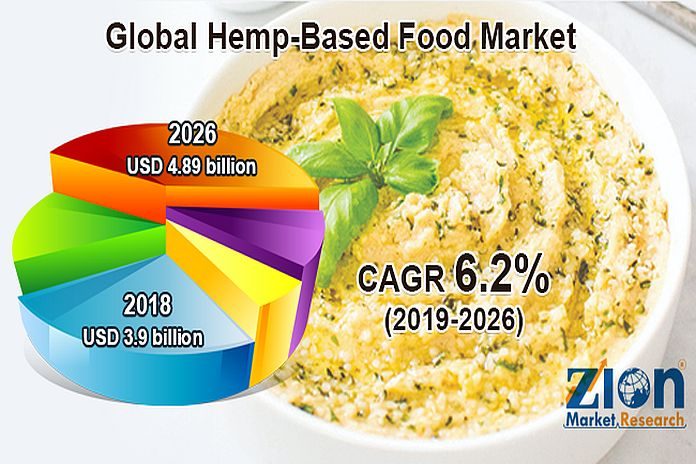NEW YORK, USA – According to Zion Market Research, the global hemp-based food market was approximately USD 3.9 billion in 2018 and is expected to generate around USD$4.89 billion by 2026, at a CAGR of around 6.2 percent between 2019 and 2026.
Hemp is widely used as a source of fiber and oil. Hemp seeds are rich in protein, vitamins, and minerals. Hemp seeds are the only edible seeds with gamma-linolenic acid (GLA). Whole hemp seeds are cold-pressed for oil and can be even hulled for exposing the seed meat.
The global hemp-based food market is likely to experience notable growth in the future, owing to the increasing product demand from the food and beverage. This increased demand can be attributed to growing consumer awareness regarding the benefits of hemp products. These products are a rich source of omega-3 and omega-6, amino acids, and proteins, which aid in balancing insulin, improving cardiac function, stabilizing mood swings, and promoting better skin and joint health.
Moreover, as commercial hemp cultivation is illegal in some countries across the globe, the industry is largely dependent on the import of raw fibers, seeds, and finished products. In 2017, around 36 countries grew industrial hemp, in accordance with the provisions specified by the department of agriculture in respective countries.
This rise in the growth of hemp seeds in different regions has boosted the hemp-based food market growth in the last few years. Countries like China and the UK are investing huge amounts in the research and development of hemp-based food products. Various innovation centers are also being opened by the key market players to expand their production capabilities to fulfill the growing demand by the end-users. However, the high cost of raw materials may hamper the hemp-based food market development.
Alternatively, the increasing demand in the food and beverage industry is projected to further contribute to the growing demand and development of hemp-based food. This is expected to provide growth opportunities for the hemp-based food market.
Based on the product, the hemp-based food market is fragmented into hemp seed oil, hemp protein powder, whole hemp seed, hulled hemp seed, and others. The hemp seed oil segment holds the highest market share currently and is likely to grow further over the forecast time period. On the basis of the distribution channel, the hemp-based food market is categorized into supermarket stores, convenience stores, hypermarket stores, and others.
By region, the global hemp-based food market includes North America, Europe, Latin America, Asia Pacific, and the Middle East and Africa. The Asia Pacific was the largest market for hemp-based food products in 2018. The region’s key revenue pockets are the emerging countries of China and India, which are the major consumers of hemp-based food products.
Some major players operating in the global hemp-based food market are Agropro, Nutiva, Hempco, Manitoba Harvest, Canada Hemp Foods, Elixinol, Braham & Murray, Healthy Brands Collective, Laguna Blends, The Cool Hemp Company, Hemp Foods Australia, Mettrum Originals, and Jinzhou Qiaopai Biotech.
The report is available here.





